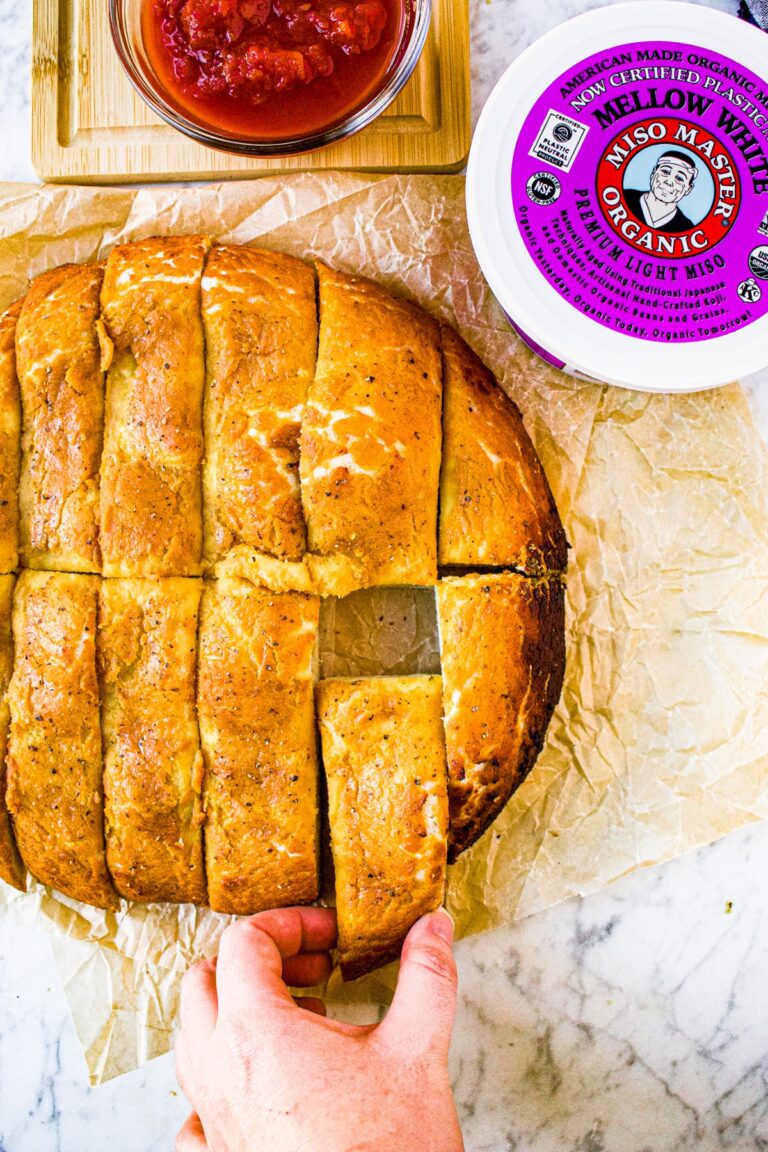How to Store Hummus and Keep It Fresh
I’m sure if you’ve ever made your own hummus you’ve asked yourself how long it will stay fresh. It’s easy to know when there’s an expiration date for you on the store’s original container, but what about fresh hummus? Today, we’re going to try and answer all your hummus-related questions from shelf-stable to fresh hummus, even “Can I freeze leftover hummus?”. The good news is you can!
This post contains affiliate links. As Amazon Associates, we earn a small commission from qualifying purchases. Click here to read our full policy about affiliate links. We are also affiliates of Souper Cubes.
A simple combination of fresh ingredients like garbanzo beans, tahini, lemon juice, and olive oil, traditional hummus is one of the most widely popular dishes in the world. Whether served with pita bread as a an appetizer or snack dip or as part of a main meal, fresh hummus is a beloved staple in many diets.
Today we’re going to discuss one of the more elusive elements of this delicious dip. How to store hummus to keep it fresh for a long time.
If you’ve ever made a big batch of homemade hummus or got a great sale on grocery store hummus, I’m sure you’ve found yourself asking “Can I freeze hummus past its expiration date?” or “How long hummus lasts in the fridge?”. Or perhaps the most dreaded question: “How can I tell if my hummus is bad?”. Well don’t worry!
Because we love to make giant batches of all types of hummus and because I am a big-time hummus fan who loves to research random topics, I’ve done the research and leg work for you. And now I’m here to provide you with the information.
Click here to Pin it for later.
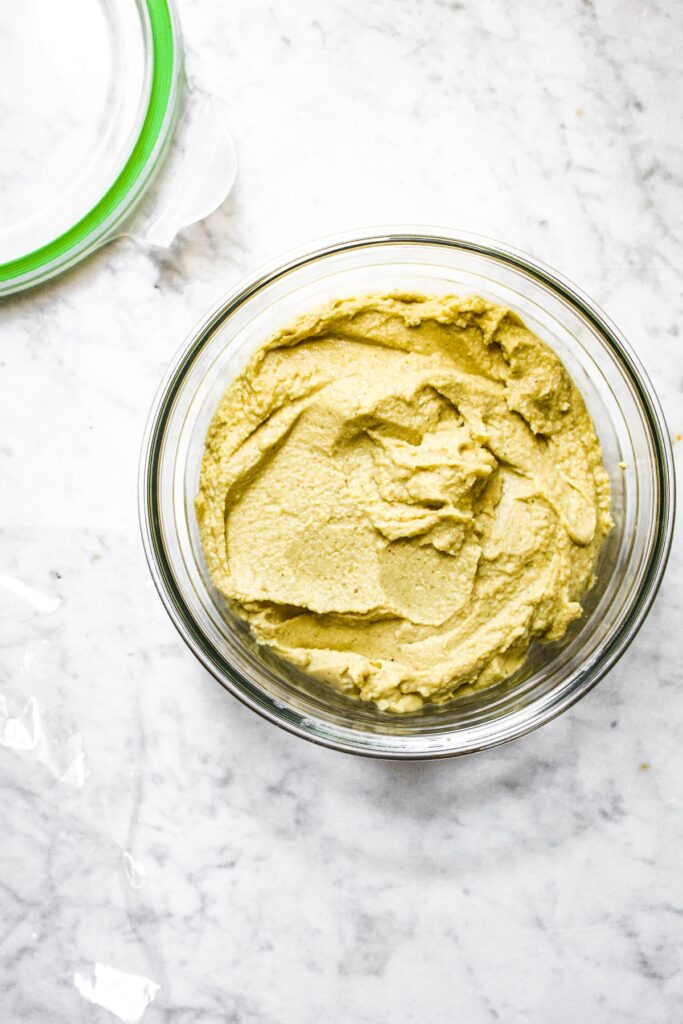
How to Store Hummus in the Fridge
The first thing to consider is the fact that the shelf life of hummus varies from homemade hummus to store-bought hummus. You also want to consider whether that grocery store hummus is from the refrigerated section or shelf stable at the time of purchase.
How long does fresh hummus last in the fridge?
Homemade hummus or fresh hummus is best for 4-5 days (or even a week), depending on storage conditions, if it’s refrigerated properly in a sealed container. A well-sealed, air-tight container that allows no oxygen, and thus no bacteria or other food odors, is extremely important to keeping hummus fresh.
How long does store-bought hummus last in the fridge?
Store bought or commercial hummus has a longer shelf life but should always be used by its expiration date. This should last up to 7-10 days (because of preservatives, etc; and all hummus brands differ) after being opened when refrigerated correctly. If the original packaging you purchased it in is not completely resealable, transfer your leftover hummus to an airtight container to be stored properly.
Shelf-stable hummus is good at room temperature in the pantry until its “best if used by” or expiration date. However, it should be kept out of direct sunlight and heat to help retain its freshness. Don’t forget to refrigerate it properly after opening…where it will be good for 7-10 days.

How to Freeze Hummus
Check out our short how to freeze hummus web story.
It will delight you to hear that yes! hummus freezes, and will last up to four months, but it’s best if used up by three months after freezing. Sealed, unopened hummus that requires refrigeration can just be placed in the freezer until you’re ready. Fresh hummus needs a little more care, so you’ll want to follow the proper procedure for freezing hummus to get the best results.
Hummus will expand a little when freezing, so don’t fill your containers to the very top. Leave a little space. I also like to spread a thin layer of olive oil or lemon juice over the top of the hummus as a barrier against bacteria. Alternatively, you can cover the hummus with a small piece of plastic wrap all the way to the edges before sealing with the airtight cover.
Freeze Hummus in Small Portions
You’ll want to freeze hummus in small portions so it both freezes and defrosts more quickly and evenly. There are few things worse you can do to hummus than defrost a large batch just to refreeze more leftover hummus again. Also, try to use a freezer-safe container to avoid freezer burn for a longer time.
We love to use our Souper Cubes to freeze hummus in portion-size blocks before transferring it to a longer-term, freezer safe, airtight container. The 1/2 cup size is perfect for single servings. The 1-cup is great for meal prep if you want to use it as a sandwich spread or snack throughout the week. The 2-cup portion size would be ideal for freezing a party-sized batch for easy party snacks.That way the next we want hummus, we can just grab what we need and leave the rest in the freezer.
How long does hummus last in the freezer?
Make sure you write the made-on date and the expected expiration date on your hummus when freezing it. After four months, the enzyme in the bean finally begins to break down and will begin to turn rancid. You’ll notice it by the sour smell given off by the hummus. If you’ve ever left beans or aquafaba in the fridge too long, it’s a little more subtle than that odor.
A quick note: “Best if used by” has to do with the freshness and best quality taste of a product, whereas the expiry date has to do with safety of the product having gone bad past a certain date.
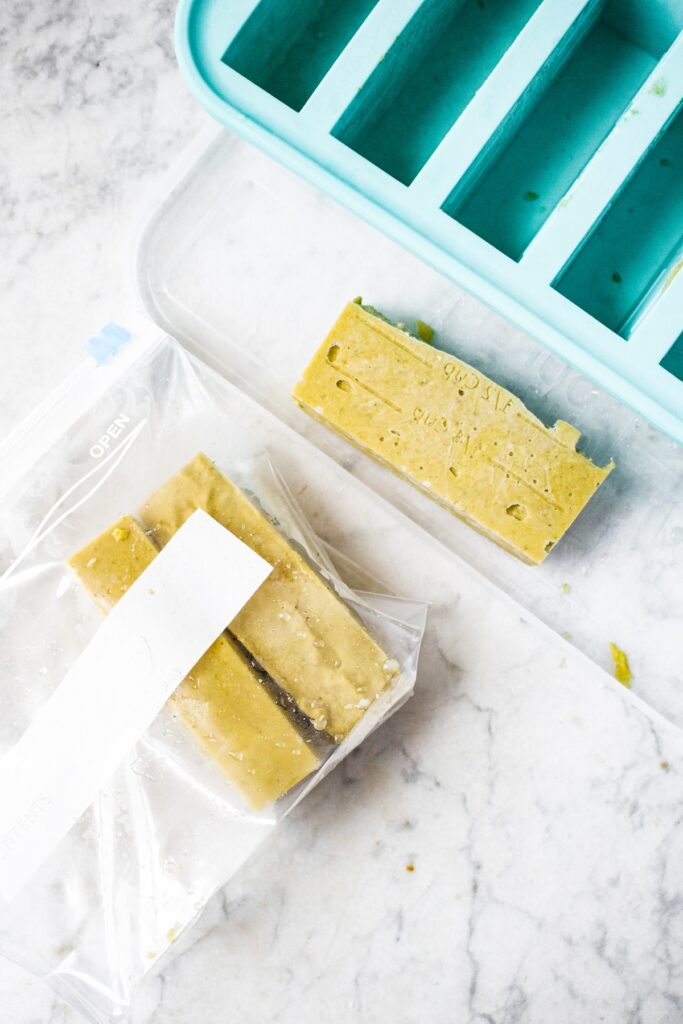
How to Defrost Hummus
The trick to getting good hummus from frozen is to allow it to thaw slowly and not to defrost too much hummus at once.
The best way to defrost hummus is to take it from the freezer 24 hours in advance and allow it to defrost slowly in the refrigerator so it’s ready the next day.
You can also place the container of hummus in a larger bowl with lukewarm water to defrost hummus, but the length of time this takes varies. I like to leave a little trickle of water running to ensure the water in the bowl doesn’t get too cold. Also, make sure that water is trickling into the bowl and not getting into your precious hummus!
You definitely don’t want to have to defrost your hummus in the microwave at the last minute, but in a pinch you can blast it at 75% power for 10-15 second bursts checking and stirring each time.
Any way you decide to defrost hummus, you’ll need to give it a good stir before serving to incorporate the ingredients that separate while frozen.
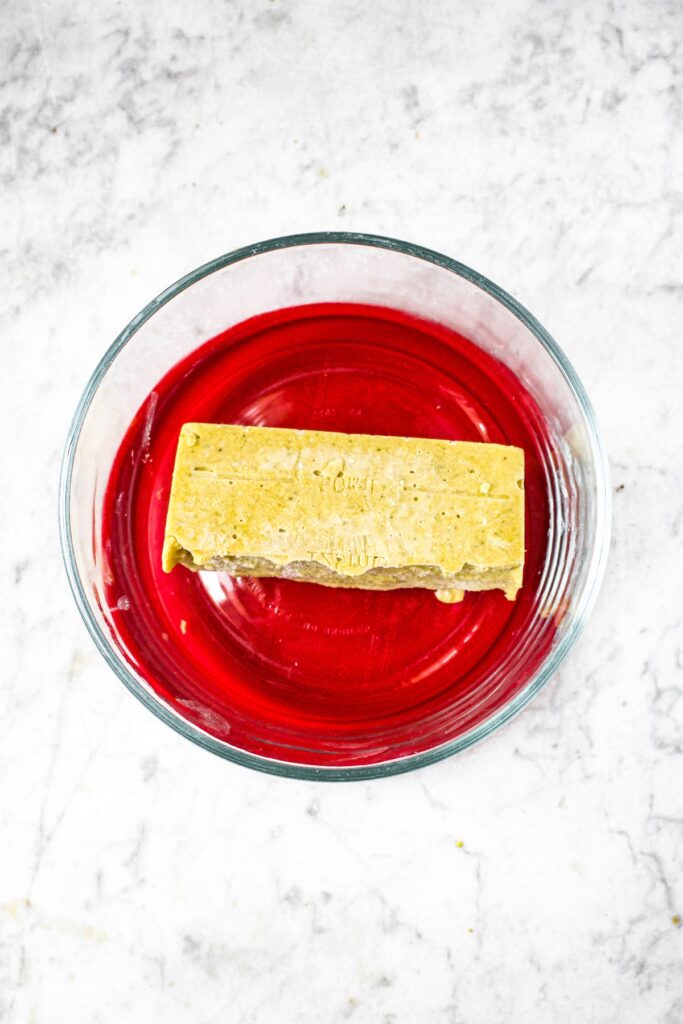
How to Know if Hummus is Bad
Again, you’ll need to stir before serving to incorporate the ingredients that separate while frozen, but don’t take that separation to mean the hummus is bad hummus.
Hummus is definitely among the more perishable foods. A good sign of spoilage is mold or severe discoloration. These are a sure sign, and if either of these are noticeably present, throw it away immediately to avoid any chance of severe food poisoning.
But your first indicator is the sour smell. Fresh plain hummus has little to no odor, so if your hummus is giving off a sour smell, it’s a good indication it’s time to toss it. You may not notice the smell or color changes until the hummus begins to defrost.
As I said earlier, if you’ve ever left beans or aquafaba in the fridge too long, you’ll know that smell. An enzyme begins to break down in the main ingredient of beans and turn the hummus rancid.
The hummus will smell sour and maybe turn a slightly different color when it’s gone bad. Flavored hummus may mask the smell, especially garlic. But if you have any doubts, throw it out. If it doesn’t smell sour, but it has even a little sour taste to it, throw it out.
Tips to Make Your Hummus Last Longer
Avoid leaving hummus out and exposed to the air.
Room temperature conditions and exposure to the air will decrease the freshness. If you’re asking how long can hummus sit out? That really depends on the temperature and atmosphere conditions. However, a usual gauge for unrefrigerated hummus is 3-4 hours before harmful bacteria begin to form.
Only take out as much as you think you’ll need and leave the rest in the refrigerator.
It’s best to just bring out small batches and add to it as needed. If you are serving hummus at a party, don’t bring out giant tubs of hummus. Put out smaller portions at a time and keep an eye on it. That way, any unused hummus doesn’t need to be tossed out at the end of the night. (But get rid of any old hummus guests left in the bowl for sure.)
Keep that hummus cold.
A good idea if serving hummus at a party, especially at high temperatures or outdoors, is to place the smaller serving bowl of hummus in a slightly larger bowl with some ice cubes or a frozen layer of ice.
Try to use clean utensils.
Bacterial growth can form very quickly and air-borne microbes are prevalent. When you reuse an instrument that has been left exposed to the air, even just for a few minutes, you risk the chance of various bacteria being introduced to your hummus. This will decrease the shelf-life of the hummus. And nobody wants that! Clean utensil = less bacteria introduced = longer lasting hummus = happy hummus eaters.
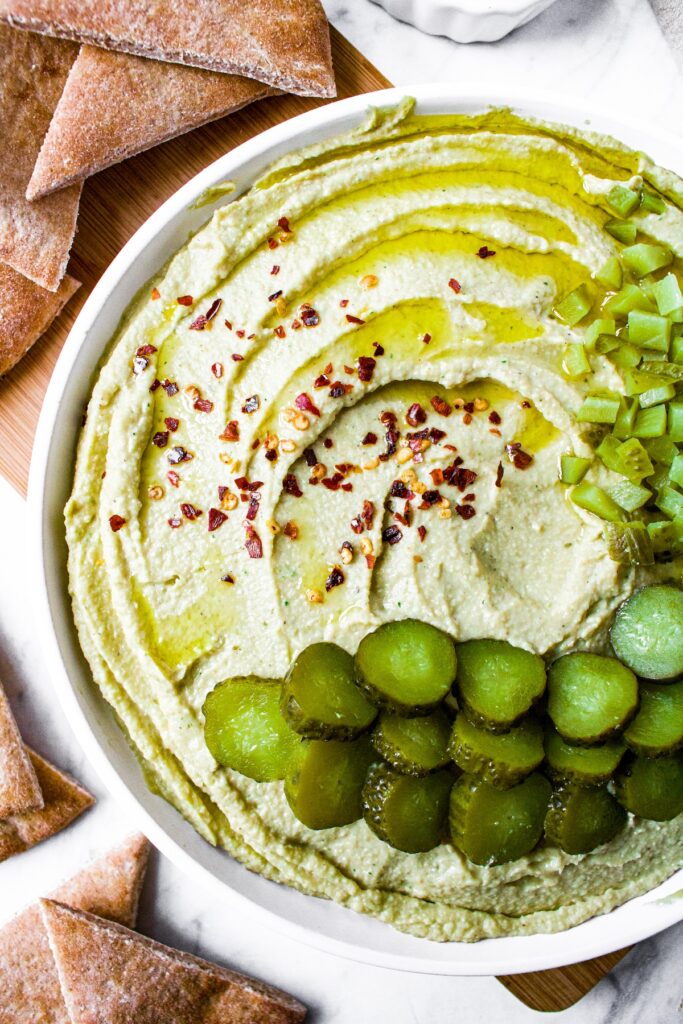
Homemade Hummus Recipes
Do you have any other questions or any tried and true tips or tricks to keeping hummus fresh? We’d love to hear them! Leave a comment below.
And if you make any of our homemade hummuses (hummusi?) tag us @theplantpowercouple in your photos on Instagram. We love to cheer you on!




